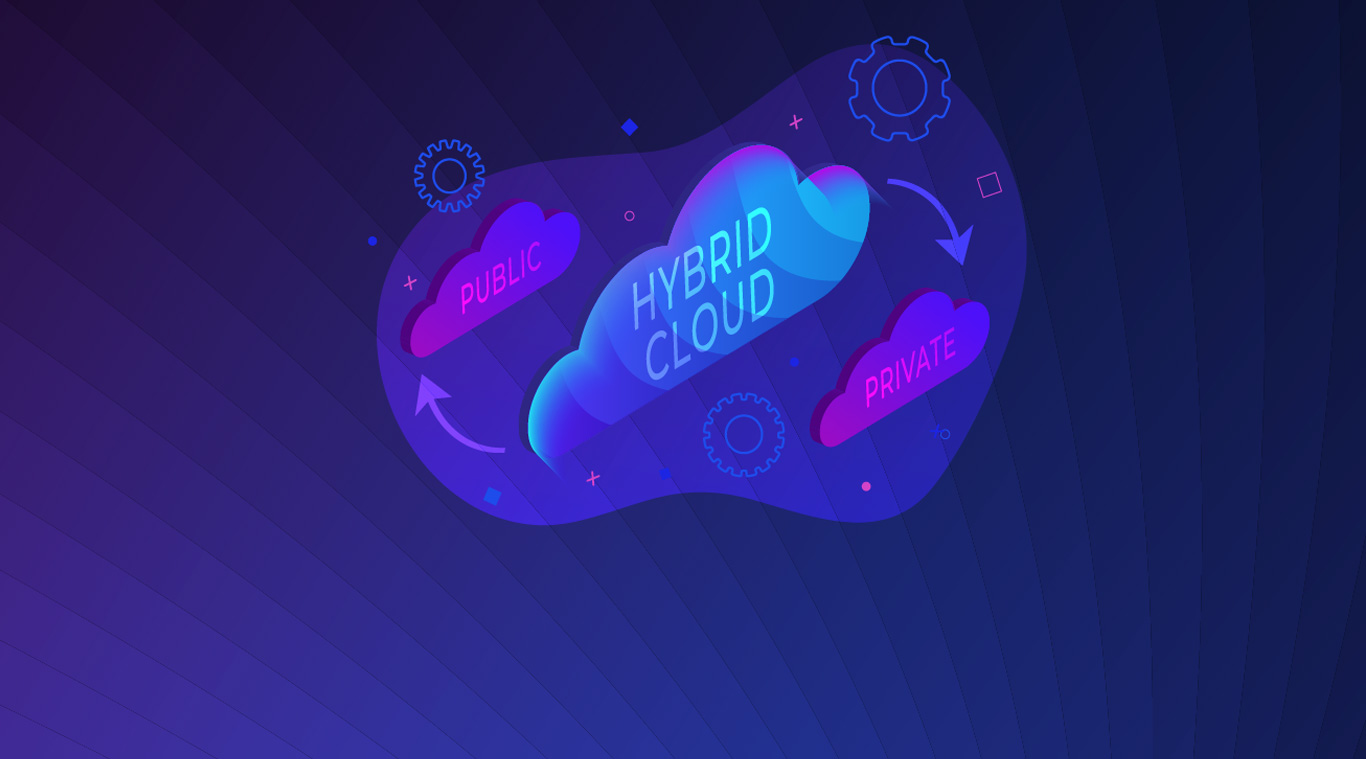Embrace the Hybrid Cloud with VMC on AWS
According to Gartner, most of midsize and enterprise customers will be adopting a hybrid or a multi-cloud strategy. Companies have already realized that in order to move to public cloud, it is important to structure workload in hybrid cloud model.
Companies must understand that hybrid IT is not an easy methodology and therefore they must organize their existing IT resources and application workloads both on-premises and in public cloud efficiently to accomplish the goals of hybrid model. Additionally, they must also look for right skills for different private/public clouds and different sets of tools from respective cloud providers.
At Sify, we define some guidelines and structure to right fit your workloads in Hybrid Cloud. Please read on to know how Sify can help customers identify the right cloud (from the set of appropriate private and/or private clouds) for different sets of workloads.
Unique Challenges in Hybrid Cloud
In hybrid cloud, there are some unique challenges that businesses need to address first. key challenges that need to be addressed while designing solution on Hybrid Cloud are mentioned herein.
- Generally, it is very difficult to identify the most suitable cloud environment and manage the cost of different clouds.
- Though all cloud environments are powerful in providing features like scalability and elasticity, however the process of managing a hybrid cloud is quite a complex task.
- Security Risks: The threat of data breach or data loss is perhaps the biggest challenge faced during hybrid cloud adoption. Generally, companies prefer on-premises private cloud to protect data locally. However, in order to ensure top-tier security of data and applications on hybrid cloud, companies must draft robust data protection policies and procedures.
Identify Applications for Hybrid Cloud
It is very important to identify applications for hybrid cloud, and your decision must be based on application’s architecture, behavior and user accessibility. Below are some key points to remember while designing Hybrid Cloud strategy: –
- Consider the compatibility of applications before deciding whether you want to continue running the applications in an on-prem cloud environment or migrate them to Public Cloud.
- Identify the running cost/budget for an application and compare it with different cloud providers to choose the most suitable cloud platform that suits your budgetary outlines and business requirements.
- Pay due attention to licensing requirements before migrating to Public/Private Cloud because a minor loophole in this aspect can have a major impact on the overall business.
- Re-look experience of existing IT team to manage different Private/Public cloud seamlessly.
Why VMC on AWS as Hybrid Cloud Choice?
VMware Cloud (also called as VMC) on AWS brings VMware’s enterprise-class Software-Defined Data Centre software to the AWS Cloud and enables customers to run production applications across VMware vSphere-based private, public, and hybrid cloud environments, with optimized access to AWS services.
AWS is VMware’s preferred public cloud partner for all vSphere-based workloads. The VMware and AWS partnership delivers a faster, easier, and cost-effective path to the hybrid cloud while allowing customers to modernize applications enabling faster time-to-market and increased innovation.
New Amazon EC2 i3en.metal instances for VMware Cloud on AWS, powered by Intel Xeon Scalable processors, deliver high networking throughput and lower latency so you can migrate data centres to the cloud for rapid data centre evacuation, disaster recovery, and application modernization.
VMC on AWS can be the right choice because VMware is trusted as a trusted virtualization platform for many years in the industry and enterprise VMware ensures that all your applications run seamlessly. Plenty of companies are already running on VMware platform and have applications running on it. Below are some key identifiers for VMC on AWS:
- VMware SDDC is running on bare metal, which is delivered, operated, supported by VMware
- On-demand scalability and flexible consumption
- Full operational consistency with on-premises SDDC
- Seamless workload portability and hybrid operations
- Global AWS footprint, reach, and availability
- Native AWS services accessibility
How VMC on AWS Solution Works?
VMware Cloud on AWS infrastructure runs on dedicated, single tenant hosts provided by AWS in a single account. Each host is equivalent to an Amazon EC2 I3.metal instance (2 sockets with 18 cores per socket, 512 GiB RAM, and 15.2 TB Raw SSD storage). Each host is capable of running many VMware Virtual Machines (tens to hundreds depending on their compute, memory and storage requirements). Clusters can range from a minimum 3 hosts up to a maximum of 16 hosts per cluster. A single VMware vCenter server is deployed per SDDC environment.
How do We Access AWS Services?
For companies that are using VMware Cloud on AWS (VMC) as production environment for their business-critical application, it will require connectivity to an AWS account. This is enabled by an AWS elastic network interface which provides a 25Gbps connectivity between VMC and AWS. Applications deployed on VMC can leverage native AWS services for storage, EC2 instances, RDS Databases, load balancing and DNS routing, etc., providing customers with the best of both worlds. These native services can be accessed from applications deployed on VMC and include:
- Simple Storage Service (S3)
- Elastic File Service (EFS)
- Amazon Relational Database Service (RDS)
Sify’s Value Propositions to Help Customer Who are Looking for Hybrid Cloud Solutions
Sify has been in the Cloud industry since 2012 and has its own cloud for enterprise customers which can be tailored based on the requirement. Over the last few years, Sify has been involved in large enterprise customer requirement understanding, solutions & implementation across Private, Public & Hybrid Clouds.
Sify has dedicated, experienced and certified SMEs involved during solution stage and implementation and to provide operations services which will enable businesses to accelerate the adoption of Hybrid Cloud.
Our approach is to identify potential use cases for Hybrid Cloud options for VMC on AWS and native AWS services during the initial assessment and design phase, and we also suggest the most suitable services that can help customers meet the strategic goals. These services include the following:
- Discovery Workshop
- Assessment
- Build and Migrate
Feel free to contact us to provide your organization a tailored solutions with the required support across the various stages of the setup of VMC & AWS and migration of workloads.
Leveraging CloudEndure in the migration to AWS Cloud
With the increased demand in scalability and flexibility of the infrastructure for organization to ramp up and speed up the go-to-market approach, it has become necessary to adopt the Public Cloud which can tackle this challenge efficiently. Therefore, businesses are looking for simple, reliable, and rapid migration of on-premises workload to Public Cloud with minimal disruption. Sify, being an AWS Advance Partner, has successfully carried out many large cloud migrations for several customers using CloudEndure and the best practices it brings in.
CloudEndure is a SaaS service offering from AWS to migrate workload from any source (physical, virtual, or private/public cloud) to AWS, from one AWS region to other AWS account (within same Account), and across different AWS accounts. It uses block level continuous replication to replicate data on to the target AWS environment.
To replicate data from source machine to target machine, we need to install agent on the source machine and should have the required CloudEndure license for migration. The migration license has expiry date post which the data replication stops.
The Continuous Data Replication task is performed and pushed to the staging area (includes Replication Server, EBS Volume, S3 Storage, Subnets and IP). The CloudEndure Service Manager ensures the co-ordination among the Source Machine, Replication Server and the Target Server.
Three points of contact for CloudEndure’ s components with the external network:
- The CloudEndure Agent needs to communicate with the CloudEndure Service Manager.
- The CloudEndure Agent needs to communicate with the CloudEndure Replication Servers.
- CloudEndure Replication Servers need to communicate with the CloudEndure Service Manager and S3.
CloudEndure helps you overcome below migration challenges effectively:
- Diverse infrastructure and OS type
- Legacy application
- Complex database
- Busy continuously changing workloads
- Machine compatibility issues
- Expensive cloud skills required
- Downtime and performance disruptions
- Tight project timelines and limited budget
Best Migration Practices that CloudEndure recommends:
Planning
- Begin by mapping out a migration strategy that identifies clear business motives and use cases for moving to the cloud.
- Migrate in phases/waves or conduct a pilot light migration in which you start with the least business-critical workloads.
- Do not perform any reboots on the source machines prior to a cutover.
- When scheduling your cutover, ensure that you allow enough time for data replication to complete and for all necessary testing to be carried out.
Licensing
- Ensure that you have sufficient migration licenses for your project.
- CloudEndure Migration license is free for 90 days of use following agent installation on source machine.
- While the use of CloudEndure Migration is free, you will incur charges for any AWS infrastructure that is provisioned during migration and after cutover, such as compute (EC2) and storage (EBS) resources.
Testing
- Check and optimize the network needed for migration.
- Perform a test at least one week before you plan to migrate your source This time frame is intended for identifying potential problems and solving them, before the actual cutover takes place.
- Train the staff early on CloudEndure and mitigate any risk during testing phase only.
- Ensure connectivity to your target machines (using SSH for Linux or RDP for Windows) and perform acceptance tests for your application.
Successful Implementation
- Cutover the machine on planned date.
- Carry out the acceptance test for the application migrated and functionality.
- Remove Source machines from the console after the cutover has been completed in order to clean up the staging area, reduce costs, and remove no longer needed replication resource.
Use cases
The Most Common uses cases for CloudEndure Migration are:
- Lift and Shift, then optimize
- Vast majority of Windows/Linux server when agent can be installed on source machine
- Replicating Block Storage devices like SAN, iSCSI, Physical, EBS, VMDK, VHD
- Replicating full machine/volume
Conclusion
You must keep these above points in mind while migrating to AWS using CloudEndure to reap the desirable outcomes. Sify would be glad to help your organization as your AWS Managed Services Partner for a tailor-made solution involving seamless, cloud migration experience and for your Cloud Infrastructure management thereafter.
Kotak Special Situations Fund to invest INR 1000 crores in Sify’s Data Center business
Mumbai, 1st November, 2021: Kotak Special Situations Fund (KSSF), managed by Kotak Investment Advisors Limited (KIAL) and whose LPs include leading Sovereign Wealth Funds, and Sify Technologies Limited (‘Sify’), India’s most comprehensive ICT service & solutions provider, today announced an agreement under which KSSF will invest up to INR 1,000 crore (USD 135 million) in Sify Infinit Spaces Limited (SISL), a wholly-owned subsidiary of Sify. SISL is a leading data center services player in India, serving Indian and Global enterprise customers and hyperscalers from its ten operational Data Centers across the country.
Under the transaction, the KSSF investment will be in the form of Compulsorily Convertible Debentures, which will convert into equity based on the operational performance of SIS over a specified reference period. The funds would be used to invest in SIS’ current plan under execution of developing new Data Centers in Mumbai, Noida, Chennai, Bangalore and Hyderabad and for investment in renewable energy requirements for its operational and new Data Centers for up to INR 4,000 crore (USD 530 million).
Raju Vegesna, Chairman and Managing Director, Sify said, “India is set for significant economic growth and is becoming the first choice destination for both global businesses and investors. India is witnessing the rise of Information technology-driven entrepreneurship and business growth. The current capacity of the Data Centre industry in India is expanding at an unprecedented pace, powered by wider cloud adoption, 5G rollout and accelerated digital transformation programmes of enterprises. We are delighted to partner with KSSF as a part of this journey to build world-class Data Centre facilities for our customers to benefit from the large scale digital transformation of India.”
MP Vijay Kumar, Chief Financial Officer, Sify said, “The hyperscalers and enterprise customers have shown high confidence in colocating to our Data Centers over time and these engagements continue to scale. The KSSF partnership will give us access to long-term capital, beyond the present investment. We will, as always, be prudent in our business judgements and build facilities close to assessment of customer demand and in a modular way, deploying the latest and most cost-effective technologies for both design and operations.”
Srini Sriniwasan, Managing Director, Kotak Investment Advisors Limited said, “We are delighted to partner with Sify to build out the Data Centre capacity in India and contribute to the goal of a digitally savvy India, based on the strength of Sify’s entrepreneurial capabilities and experienced management team. Data Centers are at the core of the country’s Digital India ambition, and we believe that with vibrant entrepreneurship in the digital space, rich media consumption by an exploding well-connected population and increasing requirements for local storage of data, India’s Data Centre sector is a long term secular opportunity.”
Eshwar Karra, CEO-Kotak Special Situations Fund, Kotak Investment Advisors Limited said, “Our investment in SIS is in line with our strategy of providing capital to unique India opportunities that require flexible and customised capital solutions, which enables us to grow with our partners and participate in their success while providing value-added support and opportunistic capital in size and scale.”
About Kotak Investment Advisors Limited
Kotak Investment Advisors Limited (KIAL), a part of the Kotak Mahindra Bank (Kotak), focuses on the Alternate Assets business. KIAL was set up in early 2005 to bring a sharper focus to Kotak’s alternate assets practice and has raised/managed/advised in aggregate over USD 4.9 billion across different asset classes including Private Equity Funds, Real Estate Funds, Infrastructure Funds, Special Situations Fund, Listed Strategies and Investment Advisory, all led by independent investment teams.
For more information, visit alternateassets.kotak.com
About Kotak Special Situations Fund
Kotak Special Situations Fund (KSSF) is an Alternative Investment Fund under SEBI regulations managed by the Alternate Asset Management Company – Kotak Investment Advisors Ltd. KSSF currently manages a USD 1 billion fund and is uniquely positioned to be a provider of customised solutions capital to corporates. KSSF has partnered with companies across sectors via customised structures/solutions depending on their situation, requirements and business prospects. With an ability to tactically participate across the capital structure of an enterprise, KSSF has been targeting value propositions across a spectrum of opportunities from growth, to credit situations and stressed assets.
About Sify
Sify Technologies is India’s most comprehensive ICT service & solution provider. With Cloud at the core of our solutions portfolio, Sify is focussed on the changing ICT requirements of the emerging Digital economy and the resultant demands from large, mid and small-sized businesses.
Sify’s infrastructure comprising the largest MPLS network, top-of-the-line DCs, partnership with global technology majors, vast expertise in business transformation solutions modelled on the cloud make it the first choice of start-ups, incoming Enterprises and even large Enterprises on the verge of a revamp. More than 10,000 businesses across multiple verticals have taken advantage of our unassailable trinity of Data Centres, Networks and Security services and conduct their business seamlessly from more than 1600 cities in India. Internationally, Sify has presence across North America, the United Kingdom and Singapore.
Sify, www.sify.com and Sify Technologies, www.sifytechnologies.com are registered trademarks of Sify Technologies Limited.
Forward Looking Statements
This press release contains forward-looking statements within the meaning of Section 27A of the Securities Act of 1933, as amended, and Section 21E of the Securities Exchange Act of 1934, as amended. The forward-looking statements contained herein are subject to risks and uncertainties that could cause actual results to differ materially from those reflected in the forward-looking statements. Sify undertakes no duty to update any forward-looking statements.
For a discussion of the risks associated with Sify’s business, please see the discussion under the caption “Risk Factors” in the company’s Annual Report on Form 20-F for the year ended March 31, 2021, which has been filed with the United States Securities and Exchange Commission and is available by accessing the database maintained by the SEC at www.sec.gov, and Sify’s other reports filed with the SEC.
For information, please contact:
For further information, please contact:
Sify Technologies Limited
Mr. Praveen Krishna
+91 44 22540777 (ext.2055)


















































